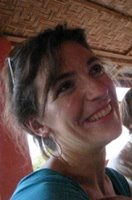Cooking With Rambam: Improved Stoves and Jewish Values*
 “I like it. It’s a great stove.” Maria repeated.
“I like it. It’s a great stove.” Maria repeated. We stared at the cement structure, built by an “improved stoves” project over a decade earlier for residents of Cape Verde’s “Ribeira Seca”. Barely visible in the blackened kitchen, it was covered with cobwebs, scrap metal, and wood for the fire that was blazing in the traditional three-stones stove nearby.
“So why don’t you use it?” we asked again. “If the improved stove cooks faster, uses less wood, and produces less smoke, why do you still use the three stones?”
She smiled bashfully and glanced at the cachupa, the national corn dish bubbling above the stones. “It’s a great stove,” she repeated. “It’s just that.. it has a small opening. You have to cut the wood to use it.”
We peered at the wood opening. It was small, but of course it was: the point of improved stoves was to maximize wood combustion, heat retention, and heat transfer to the pot. All that would cut down on unhealthy smoke, decrease pressure on dwindling forests, and limit the arduous task of wood gathering. A small opening was fundamental to achieving these ends. Clearly, for maximum effectiveness, the well-financed team of engineers would have added such a feature.
Nevertheless, these engineers created a stove less effective than even the three stones, simply, profoundly, because no one would use it. Community rejection of an efficient stove renders it worthless, just as acceptance of an inferior model renders it optimal, if it convinces residents to abandon the inefficient traditional model. Unbeknownst to those well-intentioned engineers, one clever design feature precluded the stove from having any impact at all.
* * *
Winding up the cobbled road, past the shingled farm houses that dot the climb into the jagged mountains of Serra Malagueta Park, one instantly grasps the Park’s two major goals: to protect one of Cape Verde’s few remaining forests and to reduce poverty. As a Peace Corps Volunteer, I reckoned an improved stoves project had enormous potential to tackle both of these problems. But Maria’s comment troubled me. How could we ensure that our project would sustainably impact the community and the forests, and not become another forgotten wood box in a blackened kitchen?
Judaism offers uncanny wisdom on these complex questions, which continue to baffle aid organizations today. When Rambam organized the Talmudic teachings on tzedakah into a hierarchy, he placed at the top: “enable the recipient to become self-reliant.” This idea paraphrases one of the hottest concepts in the development world: sustainable development, defined by the Peace Corps as improvements that can continue on their own without outside support. Our goal--to equip locals with a lasting way to cook cheaply, that protects their health, the trees, and saves time--serves as a good example of both concepts. But how?
Judaism might offer an answer here, too. Israel means “he who wrestles with G-d.” The Torah is filled with examples of Jews fearlessly negotiating with an all-powerful G-d. Abraham bargained for mercy on Sodom and Gomorrah, and Moses asked G-d to reconsider his punishment for the sin of the golden calf.
Perhaps from these brazen heroes emerged the Jewish value of dialogue, a fearless commitment to uncensored debate between parties at all levels, based on the assumption that good solutions only result from a truly free clash of ideas.
In the tzedakah context, this value could be interpreted as a call to consult the beneficiaries on the best way to foster self-reliance. Who, after all, has better insight into successful project design than those for whom the project is designed, even if that means building stoves with large, inefficient openings? It is still preferable to golden calves.
With that in mind, we designed a pilot project featuring several stove models that will be given to the community to test. Only after locals discuss their impressions, following a month-long trial, will we decide jointly which models to produce on a larger scale. As long as there is no actual wrestling, I think Rambam would be proud.
*Written for Panim El Panim's May Newsletter
Sources:
Using Participatory Analysis for Community Action, Peace Corps, 2005
Jews are Different by Virtue of Their Values, Rabbi Shmuley Boteach, www.shmuley.com


1 Comments:
I like the sermon Alex. How are you connected with Panim? I worked with them in DC one year.
Post a Comment
<< Home